中考英语语法词汇 【每日一题】07周:否定前移,wear
- 格式:doc
- 大小:465.00 KB
- 文档页数:4
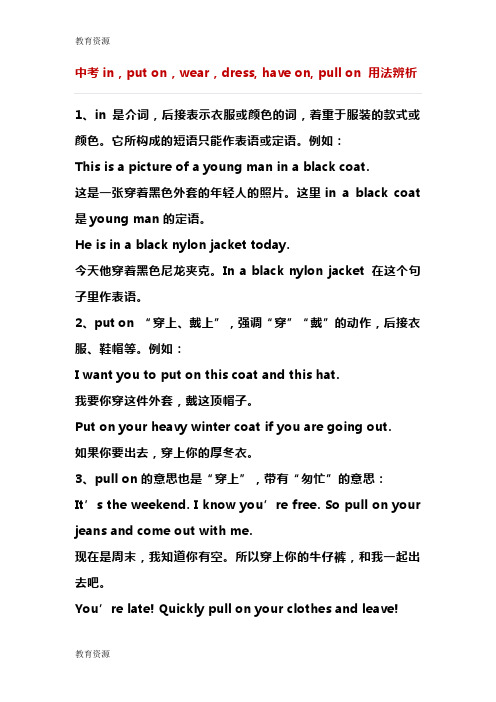
1、in是介词,后接表示衣服或颜色的词,着重于服装的款式或颜色。
它所构成的短语只能作表语或定语。
例如:This is a picture of a young man in a black coat.这是一张穿着黑色外套的年轻人的照片。
这里in a black coat 是young man的定语。
He is in a black nylon jacket today.今天他穿着黑色尼龙夹克。
In a black nylon jacket 在这个句子里作表语。
2、put on “穿上、戴上”,强调“穿”“戴”的动作,后接衣服、鞋帽等。
例如:I want you to put on this coat and this hat.我要你穿这件外套,戴这顶帽子。
Put on your heavy winter coat if you are going out.如果你要出去,穿上你的厚冬衣。
3、pull on的意思也是“穿上”,带有“匆忙”的意思:It’s the weekend. I know you’re free. So pull on your jeans and come out with me.现在是周末,我知道你有空。
所以穿上你的牛仔裤,和我一起出去吧。
You’re late! Quickly pull on your clothes and leave!你迟到了!快穿上衣服走吧!4、wear “穿着;戴着”,表示状态,宾语可以是衣帽,也可以是饰物、奖章等。
例如:You’d better wear blue or black pants with blown shoes.穿棕色鞋子的时候, 最好要穿蓝色或黑色裤子。
Why does he often wear dark sunglasses?他为什么经常戴着深色的太阳镜?5、dress的宾语通常是人,意思是“给……穿衣服”。
dress oneself 或get dressed表示给自己穿衣服。
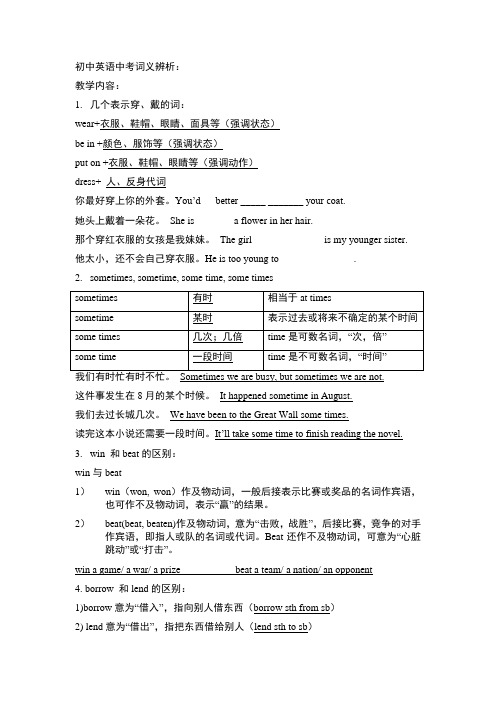
初中英语中考词义辨析:教学内容:1.几个表示穿、戴的词:wear+衣服、鞋帽、眼睛、面具等(强调状态)be in +颜色、服饰等(强调状态)put on +衣服、鞋帽、眼睛等(强调动作)dress+ 人、反身代词你最好穿上你的外套。
You’d better _____ _______ your coat.她头上戴着一朵花。
She is _______ a flower in her hair.那个穿红衣服的女孩是我妹妹。
The girl ______ _______ is my younger sister.他太小,还不会自己穿衣服。
He is too young to _______ _______.2.sometimes, sometime, some time, some timesSometimes we are busy, but sometimes we are not.这件事发生在8月的某个时候。
It happened sometime in August.我们去过长城几次。
We have been to the Great Wall some times.读完这本小说还需要一段时间。
It’ll take some time to finish reading the novel.3.win 和beat的区别:win与beat1)win(won, won)作及物动词,一般后接表示比赛或奖品的名词作宾语,也可作不及物动词,表示“赢”的结果。
2)beat(beat, beaten)作及物动词,意为“击败,战胜”,后接比赛,竞争的对手作宾语,即指人或队的名词或代词。
Beat还作不及物动词,可意为“心脏跳动”或“打击”。
win a game/ a war/ a prize beat a team/ a nation/ an opponent4. borrow 和lend的区别:1)borrow意为“借入”,指向别人借东西(borrow sth from sb)2) lend意为“借出”,指把东西借给别人(lend sth to sb)3) borrow和lend都属于非延续性动词,若表示长时间的“借”,要用延续性动词keep。
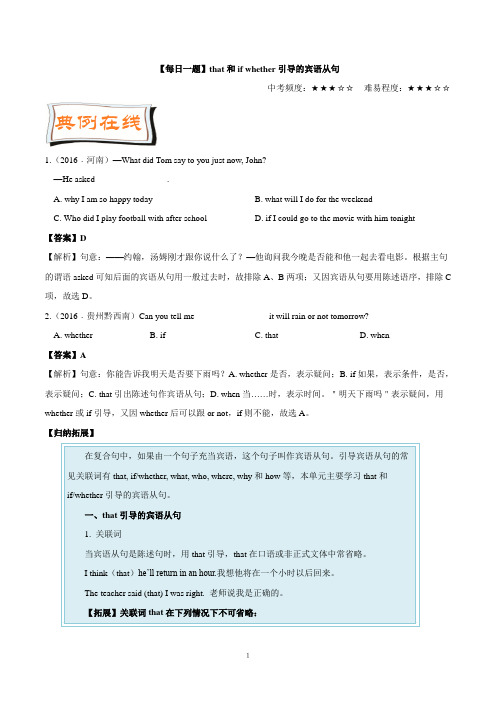
【每日一题】that和if whether引导的宾语从句中考频度:★★★☆☆难易程度:★★★☆☆1.(2016﹒河南)—What did Tom say to you just now, John?—He asked ________________.A. why I am so happy todayB. what will I do for the weekendC. Who did I play football with after schoolD. if I could go to the movie with him tonight【答案】D【解析】句意:——约翰,汤姆刚才跟你说什么了?—他询问我今晚是否能和他一起去看电影。
根据主句的谓语asked可知后面的宾语从句用一般过去时,故排除A、B两项;又因宾语从句要用陈述语序,排除C 项,故选D。
2.(2016﹒贵州黔西南)Can you tell me ________________ it will rain or not tomorrow?A. whetherB. ifC. thatD. when【答案】A【解析】句意:你能告诉我明天是否要下雨吗?A. whether是否,表示疑问;B. if如果,表示条件,是否,表示疑问;C. that引出陈述句作宾语从句;D. when当……时,表示时间。
"明天下雨吗"表示疑问,用whether或if引导,又因whether后可以跟or not,if则不能,故选A。
【归纳拓展】在复合句中,如果由一个句子充当宾语,这个句子叫作宾语从句。
引导宾语从句的常见关联词有that, if/whether, what, who, where, why和how等,本单元主要学习that和if/whether引导的宾语从句。
一、that引导的宾语从句1. 关联词当宾语从句是陈述句时,用that引导,that在口语或非正式文体中常省略。

Unit 2一、知识点1. used to 过去常常做某事,暗指现在已经不存在的动作或状态. 后跟动词原形. used to do sth.There used to be ….(反意疑问句)didn’t there?否定形式为: didn’t use to 或usedn’t to疑问形式为: Did…use to…? 或Used…to…?be/get used to doing sth.习惯于, to 为介词.2. wear 表示状态. =be in +颜色的词put on 表示动作.dress + 人给某人穿衣服.dress sb. / oneselfhave on表示状态(不用于进行时态)5. 反意疑问句:①陈述部分的主语为this, that, 疑问部分主语用it; 陈述部分主语用these, those, 疑问部分用they做主语.例: This is a new story, isn’t it?Those are your parents, aren’t they?②陈述部分是there be 结构, 疑问部分仍用there例: There was a man named Paul, wasn’t there?③I am 后的疑问句, 用aren’t I例: I am in Class 2, aren’t I?④陈述部分与含有not, no, never, few, little, hardly, seldom, neither, none 等词时,疑问部分用肯定.例: Few people liked this movie, didn’t they?但陈述句中若带有否定前缀或后缀的单词时, 这个句子仍视为肯定, 后面仍用否定.例: Your sister is unhappy, isn’t she?⑤陈述部分的主语若为不定式或V-ing 短语, 疑问部分主语用it.例: To spend so much money on clothes is unnecessary, isn’t it?⑥陈述句中主语是nobody, no one, everyone, everybody 等指人的不定代词时,疑问部分用they做主语;若陈述部分主语是something, anything, noting, everything 等指事物的不定代词时, 疑问部分用it 做主语.例: Nobody says one word about the accident, do they?Everything seems perfect, doesn’t it?⑦当主语是第一人称I时, 若谓动为think, believe, guess 等词时, 且其后跟宾丛,这时疑问句部分的人称,时态要与宾语从句保持一致, 同时还要考虑否定转移.例: I don’t think he can finish the work in time, can he?⑧前面是祈使句, 后用will you? (let’s 开头时, 后用shall we?)6. be terrified of 害怕的程度比be afraid of 深.8. no more (用在句中)=not…any more (用在句尾) 指次数;no longer (用在句中)=not…any longer (用在句尾) 指时间.11. afford + n. /pron. afford + to do 常与can, be able to 连用.例: Can you afford a new car?The film couldn’t afford to pay such large salaries.12. as well as 连词, 不但…而且…强调前者. (若引导主语, 谓动与前者在人称和数上一致例: Living things need air and light as well as water.生命不仅需要水, 还需要空气和阳光.I as well as they am ready to help you.不仅是他们, 我也愿意帮助你.13. alone = by oneself 独自一人. lonely 孤独的, 寂寞的.17.①be/ become interested in sth. 对…感兴趣②be interested in doing sth. 对做…感兴趣③show great interest in 在……方面产生极大的兴趣④a place of interest 一处名胜some places of interest如:He is interested in math, but he isn’t interested in speakingEnglish. 他对数学感兴趣,但是他对说英语不感兴趣。
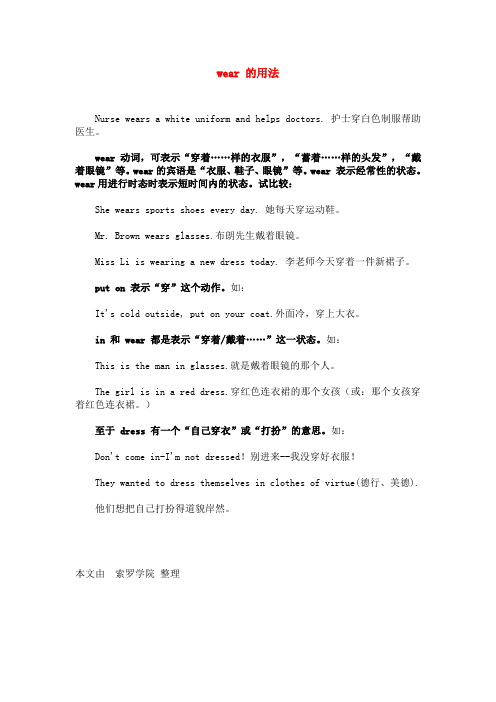
wear 的用法
Nurse wears a white uniform and helps doctors. 护士穿白色制服帮助医生。
wear 动词,可表示“穿着……样的衣服”,“蓄着……样的头发”,“戴着眼镜”等。
wear的宾语是“衣服、鞋子、眼镜”等。
wear 表示经常性的状态。
wear用进行时态时表示短时间内的状态。
试比较:
She wears sports shoes every day. 她每天穿运动鞋。
Mr. Brown wears glasses.布朗先生戴着眼镜。
Miss Li is wearing a new dress today. 李老师今天穿着一件新裙子。
put on 表示“穿”这个动作。
如:
It's cold outside, put on your coat.外面冷,穿上大衣。
in 和 wear 都是表示“穿着/戴着……”这一状态。
如:
This is the man in glasses.就是戴着眼镜的那个人。
The girl is in a red dress.穿红色连衣裙的那个女孩(或:那个女孩穿着红色连衣裙。
)
至于 dress 有一个“自己穿衣”或“打扮”的意思。
如:
Don't come in-I'm not dressed!别进来--我没穿好衣服!
They wanted to dress themselves in clothes of virtue(德行、美德).
他们想把自己打扮得道貌岸然。
本文由索罗学院整理。
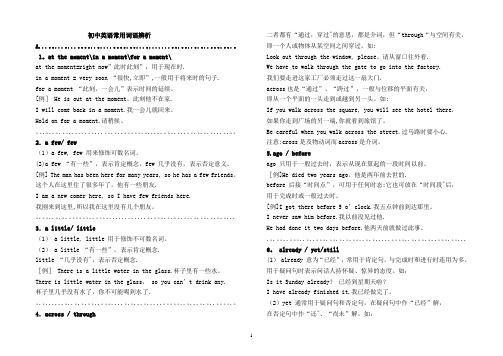
初中英语常用词语辨析A...。
...。
...。
..。
....。
.。
...。
.......。
.。
..。
.。
..。
.。
.。
1。
at the moment\in a moment\for a moment\at the moment=right now”此时此刻”,用于现在时.in a moment = very soon “很快,立即”,一般用于将来时的句子.for a moment “此刻,一会儿”表示时间的延续。
[例] He is out at the moment。
此刻他不在家.I will come back in a moment.我一会儿就回来。
Hold on for a moment.请稍候。
.。
..。
.。
......。
...。
.。
..。
.。
.....。
.。
..。
.。
.。
.。
...。
.。
2.a few/ few(1)a few, few 用来修饰可数名词。
(2)a few “有一些”,表示肯定概念,few 几乎没有,表示否定意义。
[例] The man has been here for many years, so he has a few friends。
这个人在这里住了很多年了,他有一些朋友.I am a new comer here, so I have few friends here.我刚来到这里,所以我在这里没有几个朋友。
.。
..。
.。
.。
..。
............。
.。
.。
.。
.。
..。
.。
.。
.。
.。
... 3.a little/ little(1) a little, little 用于修饰不可数名词。
(2) a little “有一些”,表示肯定概念.little “几乎没有",表示否定概念.[例] There is a little water in the glass.杯子里有一些水。
There is little water in the glass, so you can’t drink any.杯子里几乎没有水了,你不可能喝到水了. 。
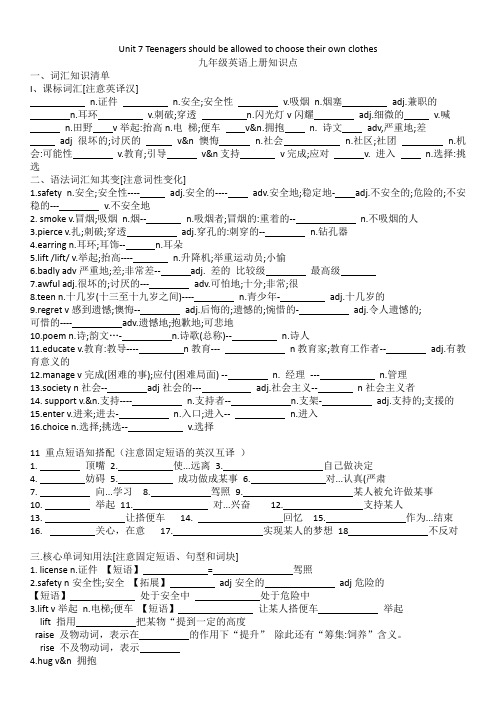
Unit 7 Teenagers should be allowed to choose their own clothes九年级英语上册知识点一、词汇知识清单I、课标词汇[注意英译汉]n.证件n.安全;安全性v.吸烟n.烟塞adj.兼职的n.耳环v.刺破;穿透n.闪光灯v闪耀adj.细微的v.喊n.田野v举起:抬高n.电梯;便车v&n.拥抱n. 诗文adv,严重地;差adj 很坏的;讨厌的v&n 懊悔n.社会n.社区;社团n.机会:可能性v.教育;引导v&n支持v完成;应对v. 进入n.选择:挑选二、语法词汇知其变[注意词性变化]1.safety n.安全;安全性----adj.安全的----adv.安全地;稳定地-adj.不安全的;危险的;不安稳的---v.不安全地2. smoke v.冒烟;吸烟n.烟--n.吸烟者;冒烟的:重着的--n.不吸烟的人3.pierce v.扎;刺破;穿透adj.穿孔的:刺穿的--n.钻孔器4.earring n.耳环;耳饰--n.耳朵5.lift /lift/ v.举起;抬高----n.升降机;举重运动员;小愉6.badly adv严重地;差;非常差--adj. 差的比较级最高级7.awful adj.很坏的;讨厌的---adv.可怕地;十分;非常;很8.teen n.十几岁(十三至十九岁之间)----n.青少年-adj.十几岁的9.regret v感到遗憾;懊悔--adj.后悔的;遗憾的;惋惜的-adj.令人遗憾的;可惜的----adv.遗憾地;抱歉地;可悲地10.poem n.诗;韵文…-n.诗歌(总称)--n.诗人cate v.教育:教导----n教育---n教育家;教育工作者--adj.有教育意义的12.manage v完成(困难的事);应付(困难局面) --n. 经理---n.管理13.society n社会--adj社会的---adj.社会主义--n社会主义者14. support v.&n.支持----n.支持者--n.支架-adj.支持的;支援的15.enter v.进来;进去-n.入口;进入--n.进入16.choice n.选择;挑选--v.选择11 重点短语知搭配(注意固定短语的英汉互译)1.顶嘴2. 使...远离3. 自己做决定4.妨碍5. 成功做成某事6. 对...认真(严肃7.向...学习8. 驾照9. 某人被允许做某事10.举起11. 对...兴奋12. 支持某人13.让搭便车14. 回忆15. 作为...结束16.关心,在意17. 实现某人的梦想18 不反对三.核心单词知用法[注意固定短语、句型和词块]1. license n.证件【短语】= 驾照2.safety n安全性;安全【拓展】adj安全的adj危险的【短语】处于安全中处于危险中3.lift v举起n.电梯;便车【短语】让某人搭便车举起lift 指用把某物“提到一定的高度raise 及物动词,表示在的作用下“提升”除此还有“筹集:饲养”含义。
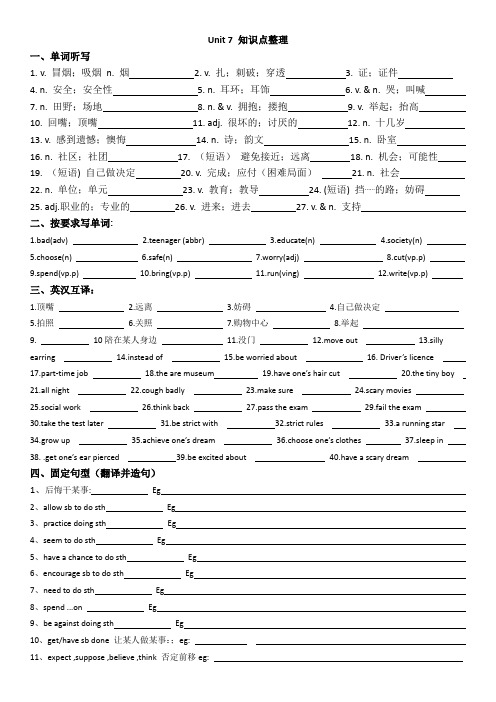
Unit 7 知识点整理一、单词听写1.v. 冒烟;吸烟n. 烟2. v. 扎;刺破;穿透3. 证;证件4. n. 安全;安全性5. n. 耳环;耳饰6. v. & n. 哭;叫喊7. n. 田野;场地8. n. & v. 拥抱;搂抱9. v. 举起;抬高10. 回嘴;顶嘴11. adj. 很坏的;讨厌的12. n. 十几岁13. v. 感到遗憾;懊悔14. n. 诗;韵文15. n. 卧室16. n. 社区;社团17. (短语)避免接近;远离18. n. 机会;可能性19. (短语) 自己做决定20. v. 完成;应付(困难局面)21. n. 社会22. n. 单位;单元23. v. 教育;教导24. (短语) 挡⋯⋯的路;妨碍25. adj.职业的;专业的26. v. 进来;进去27. v. & n. 支持二、按要求写单词:1.bad(adv)2.teenager (abbr)cate(n)4.society(n)5.choose(n)6.safe(n)7.worry(adj)8.cut(vp.p)9.spend(vp.p) 10.bring(vp.p) 11.run(ving) 12.write(vp.p)三、英汉互译:1.顶嘴2.远离3.妨碍4.自己做决定5.拍照6.关照7.购物中心8.举起9. 10陪在某人身边11.没门12.move out 13.silly earring 14.instead of 15.be worried about 16. Driver’s licence 17.part-time job 18.the are museum 19.have one’s hair cut 20.the tiny boy 21.all night 22.cough badly 23.make sure 24.scary movies25.social work 26.think back 27.pass the exam 29.fail the exam30.take the test later 31.be strict with 32.strict rules 33.a running star 34.grow up 35.achieve one’s dream 36.choose one’s clothes 37.sleep in38. .get one’s ear pierced 39.be excited about 40.have a scary dream四、固定句型(翻译并造句)1、后悔干某事: Eg2、allow sb to do sth Eg3、practice doing sth Eg4、seem to do sth Eg5、have a chance to do sth Eg6、encourage sb to do sth Eg7、need to do sth Eg8、spend ...on Eg9、be against doing sth Eg10、get/have sb done 让某人做某事:;eg:11、expect ,suppose ,believe ,think 否定前移eg:12、agree with sb 翻译:agree to/on sth 翻译;eg:13、be strict with sb 翻译;eg: be strict in sth翻译14、stop to do sth 翻译;eg: stop doing sth翻译eg: Stop sb from doing sth翻译eg:can’t stop doing sth翻译;eg:15、get in the way of = be in the way 翻译;eg:16、Seem to do sth =It seems that 翻译;eg:五、语法:情态动词的被动语态1.基本结构为“情态动词+be+及物动词的过去分词eg:2.把含情态动词的主动句变成被动句,即把“情+动原”改为“情+be+过分词”。
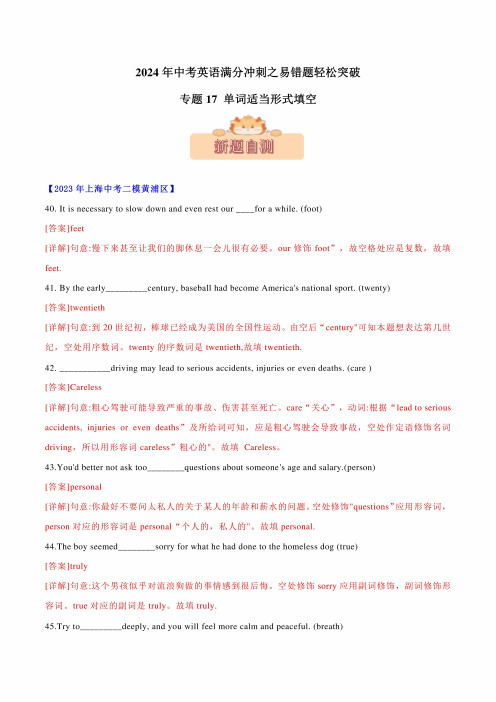

【七年级】【基础单词】1.认为(v.)think2.知道(v.)know3.整洁的(adj.)tidy4.衣服(n./pl.)clothes①毛衣(n.)sweater②裤子(n./pl.)trousers③短袜(n.)socks④短裤(n./pl.)shorts⑤裙子(n.)skirt⑥T恤衫(n.)T-shirt⑦鞋(n.)shoe5.中心(n.)center/centre6.音乐家(n.)musician7.厨房(n.)kitchen8.碟;盘(n.)dish9.练习(v./n.)practice10.可怕的(adj.)terrible11.吵闹的(adj.)noisy12.严厉的(adj.)strict13.带来(v.)bring14.在外面(adv./adj.)outside15.天气(n.)weather①干燥的(adj.)dry②寒冷的(adj.)cold③温暖的(adj.)warm④下雨;雨水(v./n.)rain⑤下雪;雪(v./n.)snow16.滑冰(v.)skate17.参观(v.)visit18.做饭(v.)cook19.消息;信息(n.)message20.国家(n.)country21.主意(n.)idea22.特色菜;特别的(n./adj.)special23.回答(v./n.)answer24.大号的(adj.)large25.受欢迎的(adj.)popular26.不同的(adj.)different27. (否定/疑问)仍然(adv.)yet【词汇拓展】1. color →colorful(adj.)丰富多彩的2. thanks →thank(v.)感谢→thankful(adj.)感激的3. English →England(n.)英格兰;英国4. see →saw(过去式)→seen(过去分词)看见5. say →said(过去式)→said(过去分词)说→saying(n.)谚语;格言6. come→came(过去式)→come(过去分词)来;来到7. think→thought(过去式)→thought(过去分词)认为;想→thoughtful(adj.)考虑周到的8. know→knew(过去式)→known(过去分词)知道;了解9. sell→sold(过去式)→sold(过去分词)出售;卖→sale(n.)销售10. thirty→thirtieth(序数词)第三十11. woman→women(复数)女子12. long(adj.)→length(n.)长度13. take→took(过去式)→taken(过去分词)买下;拿;取14. sing→sang(过去式)→sung(过去分词)唱歌→singer(n.)歌手15. swim→swimming(现在分词)→swam(过去式)→swum(过去分词)游泳16. draw→drew(过去式)→drawn(过去分词)→drawing(现在分词)画17. speak→spoke(过去式)→spoken(过去分词)说18. tell→told(过去式) →told(过去分词)告诉;讲述19. write→wrote(过去式)→written(过去分词)写作→writing(现在分词)→writer(n.)作家20. show→showed(过去式)→shown__(过去分词)给……看;展示21. make→made(过去式) →made(过去分词)使成为;制造22. teach→taught(过去式)→taught(过去分词)教;讲授→teacher(n.)老师23.story→stories(复数)故事;小说24. center→central(adj.)中心的25. fight→fought(过去式) →fought(过去分词)打架;战斗26. wear→wore(过去式) →worn(过去分词)穿;戴27. bring→brought(过去式) →brought(过去分词)带来;取来28. read→read(过去式) →read(过去分词)读→reading(n.)阅读→reader(n.)读者29. feel→felt(过去式) →felt(过去分词)感受;觉得30. keep →kept(过去式)→kept(过去分词)保持;保留31. learn →learnt/learned(过去式)→learnt/learned(过去分词)学习→learner(n.)学习者32. important →importance(n.)重要性33. noisy →noise(n.)噪音34. terrible →terribly(adv.)糟糕地35. relax →relaxes(第三人称单数)放松→relaxing(adj.)令人放松的→relaxed(adj.)感到放松的36. snow→snowy(adj.)下雪的;多雪的37. Canada→Canadian(adj./n.)加拿大的;加拿大人38. Europe→European(adj.)欧洲的39.hard→hardly(adv.)几乎不→harder(adj.)更难的40.blow→blew(过去式)→blown(过去分词)吹41.lucky→unlucky(反义词)不幸的→luck(n.)运→luckily(adv.)幸运地→unluckily(adv.)不幸地42. different→differently(adv.)不同地→difference(n.)不同之处43. popular→popularity(n.)流行【基础短语】1.上课迟到be/arrive late for class2.准时(be) on time3. (对某人)要求严格be strict(with sb.)4.捎口信take a message5.写信给某人write to sb.6.此刻,马上right now7.没问题no problem8.还行,不太坏not bad9.一口气in one go10.全世界around the world11.缺乏,不足be short of12.砍到cut down 【八年级·上】【基础单词】1.建筑物(n.)building2.差异(n.)difference3.雨伞(n.)umbrella4.绝妙的(adj.)wonderful5.足够的(adj.)enough6.在任何地方(adv.)anywhere7.想知道(v.)wonder8.好像;看来(v.)seem9.决定(v.)decide10.在……下面(prep./adv.)below11.饥饿的(adj.)hungry12.类似的(adj.)similar13.外向的(adj.)outgoing14.极好的(adj.)fantastic15.辛勤的(adj.)hard-working_16.有才能的(adj.)talented17.最初的(adj.)primary18.必要的(adj.)necessary19.比赛(n.) _competition__20.镜子(n.)mirror21.信息(n.)information22.成绩等级;评分等级(n.)grade23.邀请(v.)invite 24.谚语;格言;警句(n.)saying25.然而;不过(adv./conj)though26.到达(v.)reach27.感动;触摸(v.)touch28.分享;共享;分摊(v.)share29.讨论(n.)discussion30.文化(n.)culture31.理由(n.)reason32.介意(v.)mind33.出现(v.)appear34.期待(v.)expect35.忍受;站立(v.)stand36.获得成功的(adj.)successful37.教育的(adj.)educational38.毫无意义的(adj.)meaningless39.普通的(adj.)common40.准备好的(adj.)ready41.污染(v.)pollute42.相信(v.)believe43.环境(n.)environment44.公寓套房(n.)apartment45.工厂(n.)factory46.地球(n.)earth47.形状;外形(n.)shape48.行星(n.)planet49.太空;空间(n.)space50.已经(adv.)already51.甚至(adv.)even52.在……期间(prep.)during53.很可能;大概(adv.)probably54.可能的(adj.)possible55.音乐会(n.)concert56.日历(n.)calendar57.白天(n.)daytime58.大事(n.)event59.客人(n.) __guest__60.工作日(n.)weekday61.有空的(adj.)available62.删除(v.)delete63.答复(v.)reply64.接受(v.)accept65.抓住(v.)catch66.打印(v.)print67.使做好准备(v.)prepare【词汇拓展】1.wonder→wonderful(adj.)精彩的;绝妙的2. enjoy→enjoyable(adj.)有乐趣的;令人愉快的3.decide→decision(n.)决定;选定4. trader→trade(n./v.)贸易;交易5.try→tries(第三人称单数)→tried(过去式)→__tried__(过去分词)尝试6.building→build(v.)建造→built(过去式)→built(过去分词)建造7.loud→__loudly__(adv.)大声地→__aloud__(adv.)出声地8. win→won(过去式)→won(过去分词)获胜;赢→winner(n.)赢者9. break→broke(过去式)→broken(过去分词)(使)破;裂;碎10. saying→say(v.)→said(过去式)→__said__(过去分词)说11.care→careful_(adj.)认真的→__carefully_(adv.)认真地→__careless__(adj.粗心的→__carelessly(adv.)粗心地12.talent→_talented(adj.)有才能的13. competition→_compete__(v.)竞争14. truly→true(adj.)真实的→truth(n.)真理15. laugh→laughter(n.)笑声16.stand→stood(过去式)→stood(过去分词)忍受;站立17. plan→planning(现在分词)→__planned(过去式)→planned(过去分词)打算;计划18. become→became(过去式)→become(过去分词)开始变得;变成19. discuss→discussion(n.)讨论;商量20. meaningful→meaningless(反义词)毫无意义的→meaning(n.)意义;意思→mean(v.)意思是;打算;意欲21. success→successful(adj.)获得成功的→succeed(v.)成功22. education→educational(adj.)教育的;有教育意义的23.pollute(v.)→__pollution__(n.)污染24. build→built(过去式)→built(过去分词)建造→_building_(n.)建筑;建筑物25. fall→fell(过去式)→fallen(过去分词)跌倒;掉落26. agree→disagree(反义词)不同意→_agreement__(n.)一致;同意27. believe→believable(adj.)可信的;可信任的→unbelievable(adj.)难以置信的;不真实的28. peace→_peaceful__(adj.)和平的;安宁的→peacefully(adv.)平静地,和平地29. danger→_dangerous_(adj.)有危险的;不安全的30. hang→hung(过去式)→hung(过去分词)悬挂31.catch→caught(过去式)→caught(过去分词)→catches(第三人称单数)抓住32. opening→open(v.)打开;开放33. accept→refuse(反义词)拒绝34.prepare(v.)→preparation(n.)准备35.invite(v.)→invitation(n.)邀请【基础短语】1.有趣的事something interesting2.备考study for a test3.相当多quite a few4.出现come up5.在过去in the past6.给……的感觉feel like7.关心care about8.在某方面有天赋be talented in9.相似_be_similar_to_10.盼望做某事expect to do sth.11.发生;进行go on12.上映;出版;发行come out13.代替take sb’s place14.反复over and over again15.照顾look after16.拒绝turn down17.在……的尽头at the end of18. (帮助……)分担工作help out 【八年级·下】【基础单词】1.生病的(adj.)sick①胃痛(n.)stomachache②发烧(n.)fever③咳嗽(n./v.)cough④牙痛(n.)toothache⑤头痛(n.)headache2.情况(n.) __situation__3.乘客(n.)passenger4.勇气;意志(n.)spirit5.限制;约束;管理(v./n.)control6.提供(v.) __provide7.依靠(v.)depend8.浪费(n./v.)waste9.掉下(v.)drop10.递(v.)pass 11.发展;壮大(v.)develop12.邻居(n.)neighbor13.精神压力;心理负担(n.)stress14.日期;日子(n.)date15.报道(v./n.)report16.理解;领会(v.)realize17.奇特的;奇怪的(adj.)strange18.完全地(adv.)completely19.很大程度上(adv.)heavily20.倚;碰;撞(prep.)against21.人口(n.)population22.成就(n.)achievement23.条件(n.)condition24.力量(n.)force25.研究(v./n.)research26.包括(v.)include27.成功(v.)succeed28.达成;完成;成功(v.)achieve29.称……的重量(v.)weigh30.古代的(adj.)ancient31.野生的(adj.)wild32.省份(n.)province33.收集(v.)collect34.进步(v./n.)progress35.社会的(adj.)social36.和平的(adj.) __peaceful37.完美的(adj.) __perfect38.快速的(adj.)rapid39.是否(prep./conj.)whether40.无论何时(conj.)whenever【词汇拓展】1. death→dead(adj.)死亡的→die(v.)死→dying(现在分词)将死的2. hit→hit(过去式)→hit(过去分词)击;打3. lie→lying(现在分词)→lay(过去式)→lain(过去分词)躺;平躺4. hurt→hurt(过去式)→hurt(过去分词)(使)疼痛;受伤5. mean→meant(过去式)→meant(过去分词)意思是→meaning(n.)意思→meaningful(adj.)有意义的→_meaningless_(adj.)毫无意义的6.sweep→swept(过去式)→swept(过去分词)扫;打扫7.throw→threw(过去式)→thrown(过去分词)扔8.lend→lent(过去式)→lent(过去分词)借出9. fair→unfair(反义词)不合理的;不公正的→fairness(n.)公正性;合理性10. neighbor→neighborhood(n.)小区;街区11.begin→began(过去式)→begun(过去分词)开始→beginning(n.)开头;开端12.beat→beat(过去式)→beat(过去分词)敲打;打败13. rise→rose(过去式)→risen(过去分词)升起;增加14. fall→fell(过去式)→fallen(过去分词)掉下;跌落→fallen(adj.)倒下的15. ice→icy(adj.)覆盖着冰的;冰冷的16. heavy→heavily(adv.)在很大程度上;大量地→__heavier__(比较级)沉重的→heaviest(最高级)最重的17. strange→stranger(n.)陌生人18. wood→wooden(adj.)木制的;木头的19match→matches(名词复数)火柴20. true→truly(adv.)真实地→truth(n.)真相21. asleep→sleep(v.)睡觉→sleepy(adj.)困倦的22. complete→completely(adv.)彻底地;完全地23. silent→silence(n.)沉默;缄默;无声24. report→reporter(n.)记者→Asian(adj./n.)亚洲的;亚洲人26. nature→natural(adj.)自然的27.excite→excitement(n.)兴奋→excited(adj.)激动的→exciting(adj.)激动人心的28. succeed→success(n.)成功→successful(adj.)成功的→successfully(adv.)成功地29. wake→awake(adj.)醒着的→woke(过去式)→woken(过去分词)弄醒30. tour→tourist(n.)旅行者;观光者31.achieve→achievement(n.)成就;成绩32. weigh→weight(n.)重量33. ill→illness(n.)疾病34. wide→widely(adv.)广泛地→width(n.)宽度35. protection→_protect_(v.)保护;防护36. include→including(prep.)包括37. believe→believable(adj.)可相信的;可信任的→unbelievable(反义词)难以置信的ual→usually(adv.)通常→unusual(反义词)不平常的39. social→society(n.)社会40. safe→dangerous(反义词)危险的→safely(adv.)安全地→safety(n.)安全41. courage→encourage(v.)鼓励42. German→__Germans__(名词复数)德国人→Germany(n.)德国【基础短语】1.感冒have a cold2.量体温take one’s temperature3.发烧have a fever4.令人惊讶的to one’s surprise5.多亏了thanks to6.及时in time7.用完run out of8.顶嘴shout back9.介意做某事mind doing10.结果as a result11.总是all the time12.依赖depend on13.乱七八糟in a mess14.路过walk by15.沉默in silence16.熬夜stay up late 17.清理clean up18.剩下的the rest of19.叫喊;呼唤call out20.屏住呼吸stop breathing21.实现梦想achieve one’s dream22.即使even though23.出生时at birth24.走路时撞着walk into25.绊倒fall over26.大约or so27.死于die from28.砍伐cut down29.受到威胁的动物endangered animals__30.到达(某数量、程度等)be up to31.导致lead to32.举起;搭建__put_up__【九年级】【基础单词】1.教科书(n.)textbook2.交谈(n.)conversation3.知识(n.)knowledge4.语法(n.)grammar5.句子(n.)sentence7.能力(n.)ability8.大脑(n.)brain9.搭档;同伴(n.)partner10.注意(n.)attention11.秘密(n.)secret12.速度(n.)speed13.有耐心的(adj.)patient14.活跃的(adj.)active15.发现(v.)discover16.重复(v.)repeat17.增加(v.)increase18. (使)连接(v.)connect19.复习(v.)review20.创造;创建(v.)create21.角落(n.)corner22.地址(n.)address23.要求;请求(n./v.)request24.方便的(adj.)convenient25.直接的(adj.)direct26.正确的(adj.)correct27.东方(adj./adv./n.)east28.在……旁边(prep.)beside29.表面(n.)surface30.材料(n.)material 31.交通(n.)traffic32.交易会(n.)fair33.产品(n.)product34.高温;加热(n./v.)heat35.当地的(adj.)local36.国际的(adj.)international37.可移动的(adj.)mobile38.生产(v.)produce39.处理(v.)process40.避免(v.)avoid41.完成(v.)complete42.田野(n.)field43.安全(n.)safety44.社区(n.)community45.机会(n.)chance46.社会(n.)society47.选择(n.)choice48.感到遗憾;懊悔(v./n.)regret49.举起;电梯(v./n.)lift50.支持(v./n.)support51.完成(v.)manage52.进来(v.)enter53.教育(v.)educate54.讨厌的(adj.)awful55.更喜欢(v.)prefer56.推断(v.)suppose57.反映(v.)reflect58.表演(v.)perform59.粘贴(v.)stick60.感觉到;感觉(v./n.)sense61.遗憾;同情(n./v.)pity62.伤口;使受伤(n./v.)wound63.大师;主人;掌握(n./v.)master64.表扬(v./n.)praise65.电子的(adj.)electronic66.总数;全体的(n./adj.)total67.平滑的(adj.)smooth68.空闲的;抽出(adj./v.)spare69.情况(n.)case70.对话(n.)dialogue71.财富(n.)wealth72.勇气(n.)courage73.同意(n.)agreement74. (使)失望(v.)disappoint75. (仔细地)检查;检验(v.)examine76.踢(v.)kick77.拉(v.)pull78.使人不舒服(adj.)uncomfortable79.苍白的(adj.)pale80.灰色的(adj.)gray81.总统(n.)president82.优点(n.)advantage83.工业(n.)industry84.承担得起(v.)afford85.回收利用(v.)recycle86.残忍的(adj.)cruel87.有害的(adj.)harmful88.塑料的/塑料(adj./n.)plastic【词汇拓展】1. pronounce→pronunciation(n.)发音2. express→expression(n.)表达3.discover→discovery(n.)发现;发觉4. born→birth(n.)出生5. direct→directly(adv.)直接地direction(n.)方向→director(n.)导演;部门负责人6. speak→speaker(n.)发言者→speech(n.)讲话7. suggest→suggestion(n.)建议8. center→central(adj.)中心的9.east→eastern(adj.)东方的10. polite→politely(adv.)礼貌地→impolite(反义词)不礼貌的11. society→social(adj.)社会的12. safe→safety(n.)安全→safely(adv.)安全地13. badly→bad(adj.)坏的;糟的→worse(比较级)更坏的→worst(最高级)最差的14. choose→chose(过去式)→chosen(过去分词)→choice(n.)选择;挑选15. prefer→__preferred(过去式)→preferred(过去分词)更喜欢16. stick→stuck(过去式)→stuck(过去分词)粘贴;将……刺入17. shut→shut(过去式)→shut(过去分词)关闭;关上18. sad→sadness(n.)悲伤;悲痛19. direct→director(n.)导演;部门负责人→direction(n.)方向20. perform→performance(n.)表演21. pain→painful(adj.)令人痛苦的;令人疼痛的22.drive→drove(过去式)→driven(过去分词)开车,迫使23.nod→nodded(过去式)→nodded(过去分词)点头24. agree→agreement(n.)意见一致→disagree(v.)不同意25. weigh→weight(n.)重量26. friend→friendship(n.)友谊→friendly(adj.)友好的→unfriendly(形容词反义词)不友好的27. courage→encourage(v.)鼓励28.fish→fisherman(n.)→fishermen(复数)渔民w→lawyer(n.)律师30. science→scientist(n.)科学家→scientific(adj.)科学的31. advantage→disadvantage(反义词)缺点;不利条件32. wood→wooden(adj.)木制的33. harm→harmful(adj.)有害的34. cost→cost(过去式)→cost(过去分词)花费【基础短语】1.和……对话have conversations with2.与生俱来be born with3.在……方面有相同之处have...in common4.逐字地word by word5.坠入爱河fall in love with6. ……的秘诀the secret to7.查阅look up8.犯错误make mistakes9.取决于depend on10.路过;经过pass by11.据我所知as far as I know12.手工by hand13.世界各地all over the world14.变成turn into15.发送;放出send out16.最终成为end up as17.关心care about18.对……是认真的be serious about19.使……兴奋起来cheer up20.既然那样;假使那样的话in that case21.及时in time22.偶尔地;间或once in a while23.关闭;停止运转shut off24.宁愿would rather25.取代某人的位置take one’s position26.召来call in 27.使某人发疯/疯狂drive sb. crazy/ mad28.成为某人的朋友be friends with sb.29.使某人失望let sb. down30.卖光sell down31.对某人苛刻be hard on sb.32.齐心协力pull together33.而不是rather than34.参与;起作用play a part in35.减少;降低cut down36.而不是instead of37.有影响make a difference38.听说hear of39.切除cut off40.对……有害be harmful to41.在……顶部at the top of42.制定法律develop laws43.上下颠倒upside down44.建立set up45.参加take part in46.付费;付出代价pay for47.采取行动take action48.好好利用某事put sth. to good use49.扔掉throw away50.拆下;摧毁pull ... down51.关掉turn off52.减少cut down。
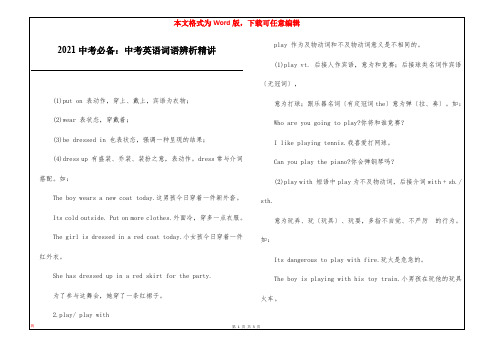
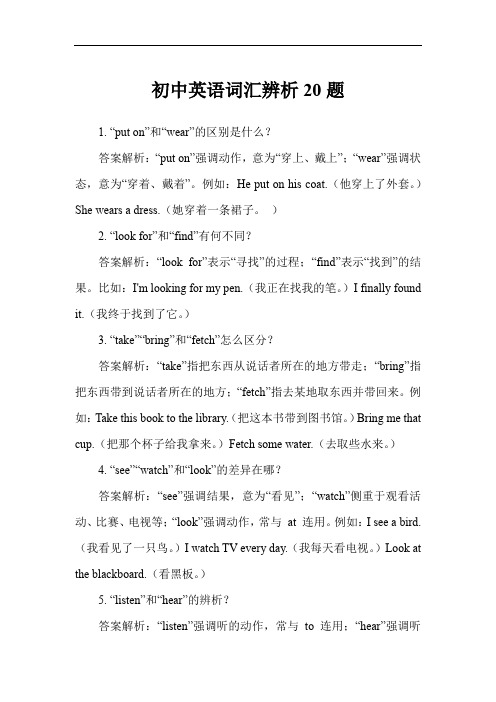
初中英语词汇辨析20题1. “put on”和“wear”的区别是什么?答案解析:“put on”强调动作,意为“穿上、戴上”;“wear”强调状态,意为“穿着、戴着”。
例如:He put on his coat.(他穿上了外套。
)She wears a dress.(她穿着一条裙子。
)2. “look for”和“find”有何不同?答案解析:“look for”表示“寻找”的过程;“find”表示“找到”的结果。
比如:I'm looking for my pen.(我正在找我的笔。
)I finally found it.(我终于找到了它。
)3. “take”“bring”和“fetch”怎么区分?答案解析:“take”指把东西从说话者所在的地方带走;“bring”指把东西带到说话者所在的地方;“fetch”指去某地取东西并带回来。
例如:Take this book to the library.(把这本书带到图书馆。
)Bring me that cup.(把那个杯子给我拿来。
)Fetch some water.(去取些水来。
)4. “see”“watch”和“look”的差异在哪?答案解析:“see”强调结果,意为“看见”;“watch”侧重于观看活动、比赛、电视等;“look”强调动作,常与at 连用。
例如:I see a bird.(我看见了一只鸟。
)I watch TV every day.(我每天看电视。
)Look at the blackboard.(看黑板。
)5. “listen”和“hear”的辨析?答案解析:“listen”强调听的动作,常与to 连用;“hear”强调听的结果。
比如:Listen to me.(听我说。
)I hear a noise.(我听到了一个声音。
)6. “He runs very ____.” (fast / quickly)答案:fast 。

Wear的被动语态形式引言被动语态是英语中常用的语法形式之一,它可以用来表达主动句中的动作或状态是由被动句中的主语承受或遭受的。
在本文中,我们将探讨”wear”这个动词的被动语态形式,并详细介绍其构成方式、用法和相关注意事项。
一、构成方式一般情况下,将”wear”转换为被动语态时,需要使用助动词”be”加上过去分词形式”worn”。
具体构成方式如下:1. 现在时被动语态:•肯定句:am/is/are + worn•否定句:am/is/are not + worn•疑问句:Am/Is/Are + worn?例子: - The dress is worn by her.(这条裙子被她穿了。
) - The shirtsare not worn by them.(这些衬衣没有被他们穿。
) - Are the shoes worn by him?(这些鞋子是他穿的吗?)2. 过去时被动语态:•肯定句:was/were + worn•否定句:was/were not + worn•疑问句:Was/Were + worn?例子: - The necklace was worn by her yesterday.(昨天这条项链被她戴了。
)- The hats were not worn by them at the party.(在派对上他们没有戴这些帽子。
) - Were the gloves worn by him?(这些手套是他戴的吗?)3. 将来时被动语态:•肯定句:will be + worn•否定句:will not be + worn•疑问句:Will + be + worn?例子: - The new uniform will be worn by all the students next week.(下周所有学生都将穿新制服。
) - The old dresses will not be worn by them anymore.(这些旧裙子将不再被他们穿。

2018初中英语词汇之易错动词集锦(4)
wear/put on/ dress
①wear穿着,戴;留,表示状态是及物动词需加宾语例句:
1)She always wears a pair of glasses.
(她总是戴着一副眼镜。
)
2)He wears a black jacket today.
(今天他穿着一件黑色的夹克。
)
②put on穿上,戴上,表示动作
例句:
1)The teacher put on his hat and went out of the office. (老师戴上帽子然后走出办公室。
)
2)Put on the gloves .Its cold outside.
(戴上手套外面很凉。
)
③dress作穿着的衣服解;给某人穿衣服不用写衣服例句:
1)She is dressed in red.
(她穿着红衣服。
)
2)The mother dresses the child every day.
(那位母亲每天给孩子穿衣服。
)此句不能加衣服。
3)She dresses herself in red. (此句等于第一个例句。
)。

wear的用法和短语例句是什么意思wear有磨损;穿戴;使疲劳等意思,那么你知道wear的用法吗?下面跟着店铺一起来学习wear的用法和短语例句吧,希望对大家的学习有所帮助!wear的用法wear的用法1:wear是不可数名词,基本意思是“穿着,戴着”,指“穿或戴的状态”,也可指“穿戴的衣物”,此时多与其他词构成复合词。
wear引申可指“使用,用坏”和“耐用性”。
wear的用法2:wear and tear意为“损坏,损耗,用坏”,尤指正常使用所造成的损坏。
wear的用法3:wear用作动词的基本意思是“穿着,戴着”,可表示穿的动作,也可以表示一种持续的或经常的状态,其后不仅可接衣服,也可接帽子、眼镜等,还可表示“佩戴”“涂抹”。
wear的用法4:wear引申还可指“保持某种状态”,作“许可”解时,多用于疑问句或否定句结构。
wear的用法5:wear可用作及物动词,也可用作不及物动词。
用作及物动词时,后接名词或代词作宾语,还可接以形容词充当补足语的复合宾语。
wear的用法6:wear的进行时可表示按计划或安排即将发生的动作,此时句中一般有表示将来的时间状语或特定的上下文。
wear的用法7:wear用作不及物动词时,主动形式可表示被动意义。
wear的用法8:wear还可用作系动词,表示经使用后的变化,后接形容词作表语。
wear的词汇辨析wear,dress,put on这些动词或词组均含“穿衣,穿”之意。
wear 最常用词,指穿衣、鞋袜或戴手套等,侧重穿戴的状态。
dress 普通用词,指给自己或他人穿衣。
既表动作又可表状态。
put on 普通用语,指把衣服、鞋袜、帽子、手套等戴上去,侧重穿戴的动作。
wear的常用短语wear away( v.+adv. )wear down( v.+adv. )wear off( v.+adv. )wear on1( v.+adv. )wear on2〔upon〕( v.+prep. )wear out( v.+adv. )wear through( v.+adv. )wear up( v.+adv. )wear的用法例句1. He arrived on January 9, disheveled and much the worse for wear.他是1月9号到的,蓬头垢面,疲惫不堪。

初中中考英语必考易错题含答案解析1、 ---Does the child need any help?( ) ---No He is old enough to _____ himselfA. put onB. wearC. dressD. take care【解析】put on 强调穿的动作,wear 强调穿着的状态,dress后面接人做主语,dress sb.给某人穿衣,dress oneself给自己穿衣,take care of 照顾。
答案为C。
2、---What did the headmaster ______ at the meeting? ---SorryI left the meeting before he _______A.say,said B say,spoke. C speak,said. D.speak,spoke【解析】speak直接接宾语时,一般为语言。
排除C.D。
say指说话的内容 speak 强调说话的动作,一般在正式场合如会议上发言用speak. 答案为B。
3、Take your time, you’ll make another mistakeA. thenB. andC. ifD. or【解析】祈使句+and 如果....就祈使句+or ....否则根据题目意思别着急,否则你还会犯错误。
表示了转折答案为D。
4、 ---May I go out with you tomorrow? ---If your job ______by thenA. has been finishedB. finishC. will be finishedD. will finish【解析】job被完成,肯定用被动语态,并且是if引导的条件状语从句,不能用将来时。
答案A。
5、I’m afraid I won’t come ______ and I will be at work thenA.untilB.betweenC.duringD.for【解析】7点到9点之间,用between.答案为B。

初中英语---unit7知识点:重点词汇:证件:安全:兼职:吸烟v./n.: 极小的:哭v./n.场地:拥抱v./n.: 举起/电梯:很坏的:遗憾v./n.: 社团:机会:教育:完成:社会:支持:进入:选择:重点短语:1.shopping center 购物中心2.be worried about 替...担心3.get/have sth done 找人做事4.be not serious enough 不够认真5.seem to do 似乎做6.spend time doing 花时间做7.keep sb from danger 使...远离危险8.think back to 回想起9.take care of 照顾10.continue to do sth 继续做11.keep…away from 远离12.give sb. chances to do sth 给...做某事的机会13move out 搬出去14 talk back 顶嘴15.think back to… 回忆16.be late for… 迟到17stay out 呆在外面18.regret doing sh 后悔做过19.make one’s own decision 自己做决定20.learn…from doing sth. 从....中学习21.keep…away from 远离22.give sb. chances to do sth 给...做.....的机会23.move out 搬出去23 be strict with sb 对某人严格要求词语辨析:1.allow 的用法;(1) allow+名词。
如:We can’t allow such a thing. 我们允许这样的事情。
(2)allow sb to do sth .允许某人做某事。
如:His father allows him to go.他爸爸允许他去。
【每日一题】否定前移, wear
中考频度:★★★☆☆难易程度:★★★☆☆
1. (2018年• 内蒙古包头中考)I’m afraid I didn’t _________ you. Could you repeat your words?
A. Believe
B. follow
C. please
D. satisfy
【参考答案】B
【试题解析】句意:恐怕我没听懂你的话,你能重复一下你的话吗?动词辨析。
A. believe相信;B. follow 跟随;C. please请;D. satisfy满意。
根据下文Could you repeat your words?你能重复一下你的话吗?结合题干I'm afraid I didn't you可知是"我没听懂你的话",即I didn't follow you.所以B选项符合题意,故答案选B。
【归纳拓展】
否定前移
宾语从句跟在think,believe,suppose,expect等动词后,主句时态为一般现在时,且主
句主语是第一人称(I, we),变否定句时,要否定主句,而不是从句,我们称之为"否定前移
";变反意疑问句时,附加问句要与从句一致。
I think you are right. 我认为你是对的。
→I don’t think you are right. 我认为你是不对的。
→I don’t think he is clever, is he? 我认为他不聪明,是吗?
【助记】
"否定前移"的4个常用词
我认为(think)猜想(suppose)不可相信(believe),我期待着(expect)你的回答。
【注意】
若主句的主语是第二、三人称,变否定句时,要在从句上否定;变反意疑问句时,附加
句要与主句一致。
They think you are right. 他们认为你是对的。
→They think you are not right. 他们认为你是对的。
→They think you are right, don’t they? 他们认为你是对的,不是吗?
1
2. Marry is used to ___________ a T-shirt and jeans.
A. wear
B. put on
C. wearing
D. putting on
【答案】A
【解析】句意:玛丽习惯穿T恤和牛仔裤。
wear指穿的状态;put on强调穿的动作;又因be used to如表示“习惯做某事”,后接动词原形,故选A。
【归纳拓展】
2
翻译下列句子
1. 冬天我们要穿暖和的衣服。
___________________________________________________________________________ 2. 他戴上帽子,穿好衣服出去了。
___________________________________________________________________________ 3. 他们全都穿上最好的衣服去参加她的生日舞会。
___________________________________________________________________________ 4. 穿黑衣服的那个男孩是我兄弟。
___________________________________________________________________________ 5. 我想他不会比我干得更好。
___________________________________________________________________________ 6. 我看他不在乎,对吧?
___________________________________________________________________________
3
参考答案:
1. We need to wear warm clothes in winter.
2. He put on his hat and coat and went out.
3. They all dressed up for her birthday party.
4. The boy in black is my brother.
5. I don't think he can do it better than me.
6. I don't suppose he cares, does he?
4。